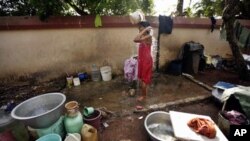Indian Prime Minister Manmohan Singh on Tuesday issued a sober warning about the management of his country’s water supply: he reminded scholars gathered in the capital that with 17 percent of the world’s population, India only possesses 4 percent of the world’s water supply.
Singh made the remark during the opening address at India Water Week, a four-day event bringing together water researchers and policymakers from around the world. He stressed the need to conserve groundwater, on which more than two-thirds of the country depends for its water.
The prime minister also attributed India's widening gap between demand and water supply to rapid economic growth and urbanization.
"Inadequate and suboptimal pricing of both power and water is promoting the misuse of groundwater," he said. "We need to move to a situation where groundwater can be treated as a common property resource."
Singh pointed out that climate change poses a further challenge to the availability of water, which is tightly interwoven with issues of food security. An estimated 300 million Indians live in extreme poverty and he added that number could rise without proper water management.
"The planning, development and management of water resources has to keep pace with current realities. The present legal situation gives every landholder the right to pump unlimited quantities of water from a bore well on his own ground. There is no regulation of ground water extraction and no coordination among competing uses."
Regardless of governance, India faces a basic mathematical conundrum when it comes to water supply, said Jin Zidell, founder of Blue Planet Network.
"You have, unfortunately, exploding populations with a fixed amount of water," Zidell said. "We're drinking the same water that the dinosaurs were drinking, a very fixed amount. I don't know how to fix that situation, other than massive change in farming techniques."
Zidell points out more than 70 percent of the world’s water supplies are used for agriculture -- a ratio that is difficult to sustain as populations grow and become wealthier.
News
India Warns of Water Scarcity
- By Kurt Achin




